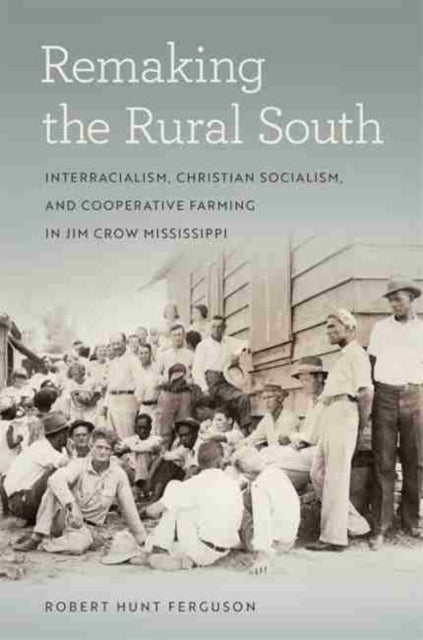Robert Hunt Ferguson
Remaking the Rural South: Interracialism, Christian Socialism, and Cooperative Farming in Jim Crow Mississippi
Remaking the Rural South: Interracialism, Christian Socialism, and Cooperative Farming in Jim Crow Mississippi
- Condition: Brand new
- UK Delivery times: Usually arrives within 2 - 3 working days
- UK Shipping: Fee starts at £2.39. Subject to product weight & dimension
Bulk ordering. Want 15 or more copies? Get a personalised quote and bigger discounts. Learn more about bulk orders.
Couldn't load pickup availability
- More about Remaking the Rural South: Interracialism, Christian Socialism, and Cooperative Farming in Jim Crow Mississippi
In the winter of 1936, a group of black and white ex-sharecropping families settled on two thousand acres in the rural Mississippi Delta to experiment with interracialism, Christian socialism, cooperative farming, and civil and economic activism. The two communities, Delta Cooperative Farm (1936-42) and Providence Farm (1938-56), were modeled after cooperative farms in Japan and Soviet Russia and had the backing of leading figures such as philanthropist Sherwood Eddy and educator Charles Spurgeon Johnson. The farms developed a cooperative economy, operated a desegregated health clinic, held interracial church services and labor union meetings, and managed a credit union. However, they were forced to close due to World War II, and Providence succumbed to economic boycotts and outside threats from white racists. Remaking the Rural South explores how a small group of committed people challenged hegemonic social and economic structures by going about their daily routines, engaging in a local movement with national and international roots and consequences.
Format: Paperback / softback
Length: 234 pages
Publication date: 30 November 2020
Publisher: University of Georgia Press
This is the first book-length study of Delta Cooperative Farm (1936 - 42) and its descendant, Providence Farm (1938 - 56). The two intentional communities drew on internationalist practices of cooperative communalism and pragmatically challenged Jim Crow segregation and plantation labor. In the winter of 1936, two dozen black and white ex-sharecropping families settled on some two thousand acres in the rural Mississippi Delta, one of the most insular and oppressive regions in the nation. Thus began a twenty-year experiment - across two communities - in interracialism, Christian socialism, cooperative farming, and civil and economic activism.
Robert Hunt Ferguson recalls the genesis of Delta and Providence: how they were modeled after cooperative farms in Japan and Soviet Russia and how they rose in reaction to the exploitation of small-scale, dispossessed farmers. Although the staff, volunteers, and residents were very much everyday people - a mix of Christian socialists, political leftists, union organizers, and sharecroppers - the farms had the backing of such leading figures as philanthropist Sherwood Eddy, who purchased the land, and educator Charles Spurgeon Johnson and theologian Reinhold Niebuhr, who served as trustees. On these farms, residents developed a cooperative economy, operated a desegregated health clinic, held interracial church services and labor union meetings, and managed a credit union. Ferguson tells how a variety of factors related to World War II forced the closing of Delta, while Providence finally succumbed to economic boycotts and outside threats from white racists.
Remaking the Rural South shows how a small group of committed people challenged hegemonic social and economic structures by going about their daily routines. Far from living in a closed community, the residents of Delta and Providence interacted with their neighbors and participated in local events and organizations. They also worked to improve the conditions of their communities, such as by advocating for better education and healthcare.
The book also explores the legacy of Delta and Providence, examining how they influenced subsequent movements for social and economic justice. The communities demonstrated that interracial cooperation and cooperative economics were viable alternatives to the dominant systems of racism and exploitation. They also showed that small-scale, community-based organizations could have a significant impact on social and economic change.
In conclusion, Remaking the Rural South is a valuable contribution to the study of social and economic history. It provides a detailed account of two intentional communities that challenged hegemonic social and economic structures and demonstrated the potential for interracial cooperation and cooperative economics. The book also sheds light on the legacy of these communities and their influence on subsequent movements for social and economic justice.
Weight: 370g
Dimension: 152 x 229 x 18 (mm)
ISBN-13: 9780820358802
This item can be found in:
UK and International shipping information
UK and International shipping information
UK Delivery and returns information:
- Delivery within 2 - 3 days when ordering in the UK.
- Shipping fee for UK customers from £2.39. Fully tracked shipping service available.
- Returns policy: Return within 30 days of receipt for full refund.
International deliveries:
Shulph Ink now ships to Australia, Belgium, Canada, France, Germany, Ireland, Italy, India, Luxembourg Saudi Arabia, Singapore, Spain, Netherlands, New Zealand, United Arab Emirates, United States of America.
- Delivery times: within 5 - 10 days for international orders.
- Shipping fee: charges vary for overseas orders. Only tracked services are available for most international orders. Some countries have untracked shipping options.
- Customs charges: If ordering to addresses outside the United Kingdom, you may or may not incur additional customs and duties fees during local delivery.


